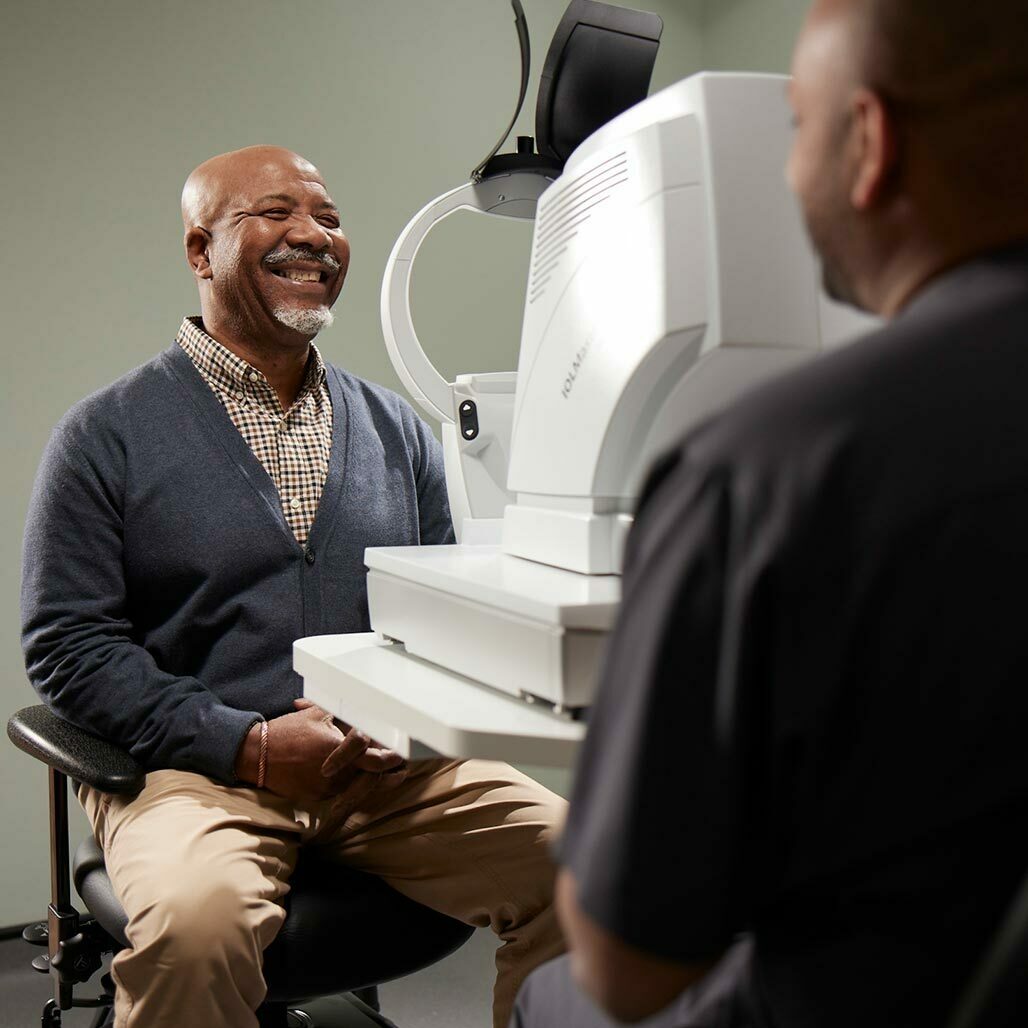They all spoke to me calmly and explained what would be happening. They were amazing.
Sarah’s story

Vitreous floaters (or eye floaters) are the black lines, dots or squiggles you sometimes see ‘float’ in and out of your vision. They’re completely normal and usually aren’t anything to worry about, but when they start getting in the way of your daily activities, eye floater treatment can be an option.
Most of us will experience vitreous floaters from time to time – you might recognise them as floating objects which follow your eye’s movement. People describe them as tadpoles, cobwebs, lace curtains, dots or squiggles floating around your field of vision.
Sometimes people can develop a few eye floaters suddenly between the age of 50-70. This is known as vitreous detachment and can occasionally be associated with a tear in the retina or sometimes retinal detachment. If you suddenly experience any of these symptoms, it’s important that you see your optician straight away, or contact A&E if your optician can’t see you quickly.
The back of your eye is filled with a jelly-like substance (a bit like egg white in consistency) known as the vitreous humour. As you get older, this substance becomes more liquid and mobile, which can cast shadows onto the light-sensitive part of the eye, the retina. These shadows are what you see floating across your vision every now and again.
If vitreous eye floaters are bothering you, you’ll usually see your optician first for an eye exam and a chat about your symptoms and the effect they’re having on your lifestyle. If your optician thinks you might benefit from treatment, they’ll refer you to specialists like our eye surgeons for some more tests and to talk about potential eye floater treatment options.
As eye floaters develop as part of the normal ageing process, it’s not possible to fully prevent them. If they become troublesome though, surgery is the only proven treatment for vitreous eye floaters.
Generally, your brain learns to ignore most of the eye floaters you see during the day, so most people get used to them and don’t need any treatment. Sometimes wearing dark glasses can help by reducing the contrast in bright conditions.
If your eye floaters get worse, you should see your optician or GP so they can check for any other potential issues or refer you for specialist eye floater treatment. Surgery for eye floaters is known as a vitrectomy and involves removing the vitreous humour (the gel-like substance at the back of your eye) and replacing it with saline.
Vitreous eye floaters can be treated with a type of surgery known as vitrectomy. Vitrectomy is a procedure that treats eye conditions related to the retina, macula and vitreous humour.
Vitrectomy surgery is recommended when your eye floaters are severe enough to consistently get in the way of your day-to-day activities, like reading, work or driving.
Vitrectomy surgery for eye floaters helps improve vision by removing the gel (vitreous humor) inside the eye, where floaters are found. This clears up the dark spots or shadows that can block or blur vision. For people with severe eye floaters that make daily activities difficult, the surgery can provide much clearer and more comfortable eyesight, improving overall quality of life.
After your eye floater treatment, your consultant will give you some eye drops to use for up to four weeks to help your eye heal. These drops will help to reduce inflammation. Your consultant will see you again for a follow-up appointment to make sure your vision has improved and your eye is healing well. You’ll usually have a review 7-10 days after your surgery and then again at about 4-6 weeks.
Although the vast majority of patients won’t experience any complications, as with all surgery there are some risks of complications. Our team will discuss these with you in detail at your appointment and will make sure you’re happy to go ahead with treatment.
Private vitrectomy surgery starts from £5,995 per eye and combined vitrectomy and cataract surgery starts from £6,995 per eye. That includes all your pre- and post-operative appointments, as well as your medication.
If you have any questions about available treatments or you’d like to book an appointment with a full assessment of your condition, get in touch with us.



Building 720, Waterside Drive, Aztec West, Almondsbury, Bristol, BS32 4UD
St Andrew's House, 4400 Parkway, Solent Business Park, Whiteley, PO15 7FJ
Unit 2, Anchorage Ave., Shrewsbury Bus. Park, Shrewsbury, SY2 6FG
Buckland House, Langley Business Park, 10 Waterside Drive, Langley, Slough, Berkshire, SL3 6EZ
If you think you have an eye condition, you should see your optician or GP for a detailed assessment. They’ll go through all the options available and tell you where you can have your treatment.
The referral process will differ slightly depending on whether you want to be an NHS or private patient. You’ll find all the information you need on our NHS and private patient pages.
Are you a health care professional?
Find out how to refer a patient.
Find details about our private
options and how to get started.
Self-referring? Call 0800 4096 792